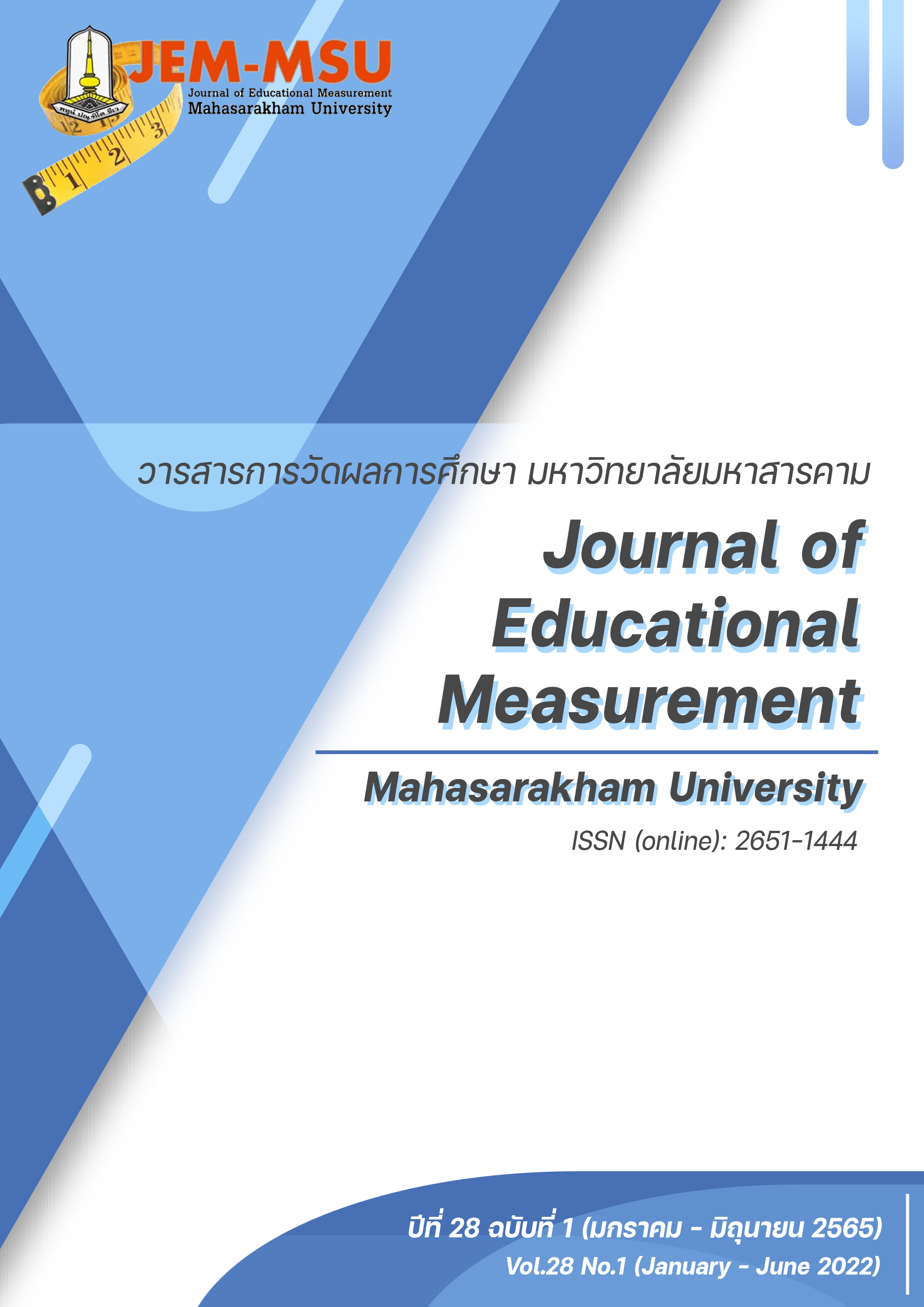การวิเคราะห์องค์ประกอบสมรรถนะวิจัยของครูมัธยมศึกษาสังกัดสำนักงานคณะกรรมการการศึกษาขั้นพื้นฐาน ในเขตภาคตะวันออกเฉียงเหนือ
Main Article Content
บทคัดย่อ
การวิจัยครั้งนี้มีวัตถุประสงค์เพื่อวิเคราะห์องค์ประกอบสมรรถนะวิจัยของครูมัธยมศึกษา สังกัดสำนักงานคณะกรรมการการศึกษาขั้นพื้นฐาน ในเขตภาคตะวันออกเฉียงเหนือ กลุ่มตัวอย่าง คือ ครูผู้สอนในโรงเรียนมัธยมศึกษาในภาคตะวันออกเฉียงเหนือ จาก 63 โรงเรียน จำนวน 500 คน ได้มาโดยการสุ่มแบบหลายขั้นตอน (multi-stage random sampling) เครื่องมือที่ใช้ในการวิจัย คือ แบบวัดสมรรถนะวิจัย จำนวน 90 ข้อ การวิเคราะห์ข้อมูลใช้สถิติเชิงบรรยาย สัมประสิทธิ์สหสัมพันธ์ของเพียร์สัน และการวิเคราะห์องค์ประกอบเชิงยืนยันด้วยโปรแกรม Mplus 7.0
ผลการวิจัย พบว่า 1) โมเดลการวัดสมรรถนะวิจัยของครูมัธยมศึกษา สังกัดสำนักงานคณะกรรมการการศึกษาขั้นพื้นฐาน ในเขตภาคตะวันออกเฉียงเหนือ ประกอบด้วย 3 องค์ประกอบ คือ (1) ด้านความรู้ในการวิจัย (knowledge) (2) ด้านคุณลักษณะของครูนักวิจัย (attributes) (3) ด้านทักษะการวิจัย (skills) และ 2) ผลการตรวจสอบความสอดคล้องของโมเดลการวัดสมรรถนะวิจัยของครูมัธยมศึกษา พบว่า โมเดลการวัดสมรรถนะวิจัยของครูมัธยมศึกษาฯ มีความสอดคล้องกลมกลืนกับข้อมูลเชิงประจักษ์โดยพิจารณาจากค่าไคสแควร์ มีค่าเท่ากับ 10.325 ที่องศาอิสระ(df) เท่ากับ 6 ระดับนัยสำคัญ เท่ากับ 0.112 ค่าดัชนีวัดระดับความกลมกลืน (CFI) เท่ากับ 0.974 ค่า TLI เท่ากับ 0.964 ค่าดัชนีรากของกำลังสองเฉลี่ยของค่าความแตกต่างโดยประมาณ (RMSEA) เท่ากับ 0.043 ค่ารากที่สองของค่าเฉลี่ยกำลังสองของเศษเหลือในรูปคะแนนมาตรฐาน (SRMR) เท่ากับ 0.012 แสดงว่า ฉะนั้นเครื่องมือนี้สามารถนำไปใช้ประเมินสมรรถนะวิจัยของครู
Article Details

อนุญาตภายใต้เงื่อนไข Creative Commons Attribution-NonCommercial-NoDerivatives 4.0 International License.
เนื้อหาและข้อมูลในบทความที่ลงตีพิมพ์ในวารสารการวัดผลการศึกษา มหาวิทยาลัยมหาสารคาม ถือเป็นข้อคิดเห็นและความรับผิดชอบของผู้เขียนบทความโดยตรง ซึ่งกองบรรณาธิการวารสาร ไม่จำเป็นต้องเห็นด้วย หรือร่วมรับผิดชอบใดๆ
บทความ ข้อมูล เนื้อหา รูปภาพ ฯลฯ ที่ได้รับการตีพิมพ์ในวารสารการวัดผลการศึกษา มหาวิทยาลัยมหาสารคาม ถือเป็นลิขสิทธิ์ของวารสารการวัดผลการศึกษา มหาวิทยาลัยมหาสารคาม หากบุคคลหรือหน่วยงานใดต้องการนำทั้งหมดหรือส่วนใดส่วนหนึ่งไปเผยแพร่ต่อหรือกระทำการใดๆ จะต้องได้รับอนุญาตเป็นลายลักษณ์อักษรจากวารสารการวัดผลการศึกษา มหาวิทยาลัยมหาสารคาม ก่อนเท่านั้น
เอกสารอ้างอิง
Condly, S. J. (1999). Motivation to learn and to succeed: A path analysis of the CANE Model of cognitive motivation [Doctor of Philosophy Dissertation]. Faculty of the Graduate School, University of Southern California.
Hair, J. F., Anderson, R. E., Tatham, R. L., & Black, W. C. (2010). Multivariate data analysis: A global perspective (7th ed.). Pearson education.
Hedrick, M. V. (2001). An analysis of motivation and achievement in the Algebra 1 classroom: the CANE model of cognitive motivation. http://thailis-db.car.chula.ac.th/doa/detail.nsp
McClelland, D. C. (1973). Testing for competence rather than for “Intelligence”. American Psychologist.
Scott B. Parry. (1997). Evaluation the impact of Training Alexandria. VA: American Society for training and Development.
Velzen, J. H. V. (2013). Educational researchers and practicality. American Educational Research Journal, 50(4), 789–811. DOI:10.3102/0002831212468787
Boonpen, P. (2018). Psychological and Situational Variables Influencing Research Competency of Academic Staff at Higher Education Institutes in Thailand. Kasem Bundit Journal, 19(1), 89 – 105. (in Thai)
Kongnual, P. (2014). Development of a model for assessing research competency of teachers. Ramkhamhaeng University. (in Thai)
Ministry of Education. (2010). National Education Act 1999 and Amendments (Second National Education Act B.E. 2002). Express Transportation Organization Press (ETO). (in Thai)
Prasertsin, A. (2016). Development of the Causal Model of Personnel Factor on Teacher’s Research Motivation through Teacher’s Self-Management in Work as Mediator. Biblical journal Science SWU, 9(1), 67-81. (in Thai)
Sanan Eu Meng Thaisong, A. (2017). Problems of Classroom Research of Office of the Basic Education Commission: North Eastern Thailand. Journal of Nakhonratchasima College, 11(3), 156-166. (in Thai)
Secretariat of the National Strategy Committee. (2019). National Strategy 2018 - 2037. The 2nd Office of the National Economic and Social Development Board. (in Thai)
Suksunai, D. (2004). Effects of factors in cane model on teachers’ classroom action research performance in Research and development in Whole school learning reform project. [Doctoral Dissertation]. Chulalongkorn University. (in Thai)
Suwanno, P. (2016). Development of Research competency evaluation model for Lecturers of Southern Rajabhat university. [Doctoral Dissertation]. Burapha University. (in Thai)
Tirakanan, S. (2006). Using statistics in social science research: A practical approach (2nd Ed.).Chulalongkorn University Press. (in Thai)
Wongwanich, S., Viraphan, S., & Marrungruang, P. (2013). Strategies for driving education reform policy: A formative research and development. PRIKWAN Graphic. (in Thai)
Xuto, N. (2005). Qualitative Research. PRINTPRO Company. (in Thai)


